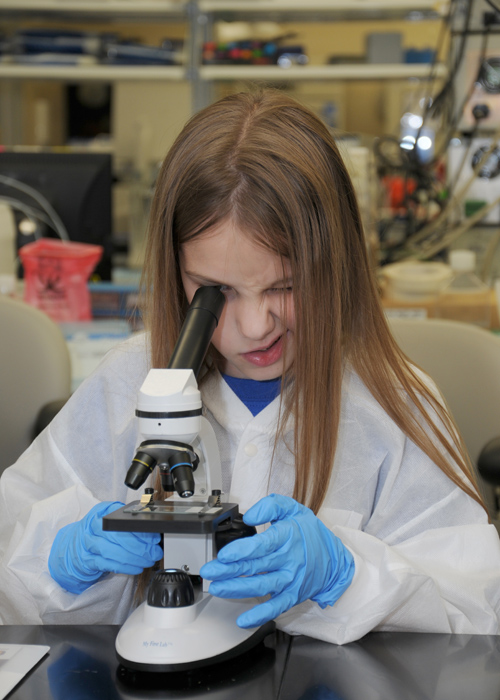GEMS Camp Makes Learning Math, Science Fun

Developing our country's future mathematicians and scientists begins in school classrooms. The Army also is doing its part in exposing young students to real-world research with hands-on activities designed to show them the joy of scientific discovery in a military setting.
For the third year, the U.S. Army Institute of Surgical Research is hosting three Gains in the Education of Mathematics and Science (GEMS) camps during June and July for San Antonio middle school students at Joint Base San Antonio-Fort Sam Houston, Texas. The four-day sessions are laboratory-based camps that provide students the opportunity to participate in scientific experiments and learn basic laboratory skills.
USAISR GEMS program coordinators, Stephanie Truss and Kathy Ryan, planned laboratory activities for the students, also known as interns.
"We have the luxury of designing activities associated with actual research being conducted here," said Truss. "Most of the students do not have this type of hands-on exposure, or if they do, the activities are not as extensive in their schools, so it's good for them."
Activities at USAISR introduce interns to subjects such as electricity, cardiology, blood typing, bacteria, DNA, surgical knots and suturing techniques, dentistry, and hair, fiber and fingerprint analysis. Two full-time, licensed teachers, or resource teachers, and four college students, or near-peers, mentor the young interns.
"We present what they know and have learned in school and show them how they can use it in the future as researchers in military labs like this one," said Leigh Anne McIver, USAISR GEMS resource teacher.
"It is a great experience for all of us," said Ashlyn Rathburn, a Texas State University elementary education major and near-peer. "We learn from each other."
GEMS interns Khalil Sample and Natalie McVay both said that the camp was fun and would recommend it to their friends.
"We don't get to do this in our school," said Sample.
Each camp is designed for 24 interns who are divided into two laboratory classrooms. The small groups allow for frequent one-on-one interaction between staff and students. Resource teacher Maria Anzaldua said she enjoys the small classroom atmosphere because it gives her the opportunity to keep the students engaged.
"If we don't [keep them engaged], then it's easy for them to lose interest," she said.
In addition to participating in hands-on activities, the interns hear from USAISR researchers about potential career paths in science, as well as their current research projects. McIver added that this one-of-a-kind experience is invaluable.
"They get to see what research is being conducted here and may someday say that they knew about it before it became known to the public," said McIver.
GEMS is one of several programs developed by the Army Educational Outreach Program to offer summer educational activities for middle and high school students who have an interest in becoming scientists, and may express an interest in working for the Army or Department of Defense in the future. GEMS summer camps are offered at various Army laboratory facilities throughout the United States.
 An official website of the United States government
An official website of the United States government
 ) or https:// means you've safely connected to the .mil website. Share sensitive information only on official, secure websites.
) or https:// means you've safely connected to the .mil website. Share sensitive information only on official, secure websites.


